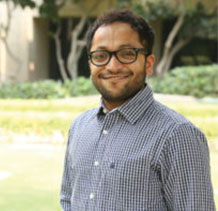Vaibhav Agrawal, Associate Partner at Lightspeed India Partners Advisors LLP, shares the reasons behind saying yes or no to a prospective investment.

Vaibhav Agrawal, an MBA from the Stanford Graduate School of Business and a trained physician, is an Associate Partner at Lightspeed India Partners Advisors LLP. He holds over six years of experience with startups across India, Silicon Valley and Boston and at Lightspeed, he focuses on consumer and enterprise investments. Prior to Lightspeed, he co-founded Prima Clinics, a network of tech-enabled family clinics and another medical device startup that crashed and burned. He also led growth projects for Stride Health and PronutriaBio, worked at the Bengaluru-based venture capital fund Aspada, and advised Fortune 500 clients at the Silicon Valley offices of McKinsey and Company.
In this interview, he shares with us his thoughts on what it takes for him to say yes or no to a deal, the VC ecosystem, the sectors that are gathering momentum and more.
In addition to the usual suspects of a great team/big problem/large market – what are the deciding factors on a deal?
As a professor at Stanford University put it elegantly: if you match a great entrepreneur with a bad market, the market will win. Match a great entrepreneur and a great market, and then magic happens. So, let me get this straight, understanding the market need and team quality are absolutely important to say yes or no.
However, there are two other things I look for: One, why the founding team came together and what consumes them about this problem. Sometimes, it is a personal experience that provides the motivation to jump in and solve the problem. In other cases, the founders have gone down a methodical structured approach to select a business category. There’s no right or wrong, but a sense of purpose can determine how successfully a company can hire talent, find customers and raise more capital.
Two, we look for building trust. It is not very different from finding the right life partner. When we make a decision to invest, we look forward to a long journey together and becoming a part of the same team. Accordingly, we need to place a high amount of respect on each other’s point of view. Openly addressing business concerns, gracefully sparring over ideas and acknowledging what’s working, what’s not all help build this trust.
What is it about your role that excites you?
The most amazing thing about this business is that I get to reimagine the future everyday; and sometimes join the journeys of remarkable companies that will shape that future. I feel fortunate to work with several inspiring entrepreneurs. I especially enjoy their energy, passion for the cause and love challenging their thinking.
Where do you see the PE/VC ecosystem in India 10 years from now?
Honestly, it is still early days for the venture capital industry in India. There is a great opportunity to build large companies and be a part of that growth as India is still early in its road to development. We have a strong population base but we are yet to see growth in per capita income and widespread adoption of technology. As both those things happen, we will see some amazing businesses get built. There are a lot of comments about it being winter in the VC industry at this time but I do not agree with this outlook. I believe that money is still available for quality entrepreneurs and startups. Anecdotally, if we look at the recent past, some defining companies were built started right after high points of the market like Facebook and Whatsapp. I think amazing companies are going to be built in the next two to three years in India.
According to you, what are the “yet-to-be-hot” sectors?
These are excitingtimes.When there is large change, new opportunities get created, and oh boy there is change and how! Jio’s disruption in data prices has completely bucked the trend on video consumption. Aadhaar has enabled acquiring customers and merchants for telecom, banking, investing for 10-100x lower prices than possible before. GST will force a whole set of other efficiencies around distribution, logistics and B2B. Think of these as highways – core infrastructure –on which several new categories could get built.
What Makes You Say Yes To An Entrepreneur?
As a professor at Stanford University put it elegantly: if you match a great entrepreneur with a bad market, the market will win. Match a great entrepreneur and a great market, and then magic happens. So, let me get this straight, understanding the market need and team quality are absolutely important to say yes or no.
However, there are two other things I look for: One, why the founding team came together and what consumes them about this problem. Sometimes, it is a personal experience that provides the motivation to jump in and solve the problem. In other cases, the founders have gone down a methodical structured approach to select a business category. There’s no right or wrong, but a sense of purpose can determine how successfully a company can hire talent, find customers and raise more capital.
Two, we look for building trust. It is not very different from finding the right life partner. When we make a decision to invest, we look forward to a long journey together and becoming a part of the same team. Accordingly, we need to place a high amount of respect on each other’s point of view. Openly addressing business concerns, gracefully sparring over ideas and acknowledging what’s working, what’s not all help build this trust.
(This article was published in Beyond Basics, property of Wealth Advisors, a full-service investment solutions firm. To read more go to https://beyondbasics.wai.in/)